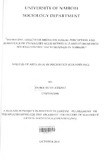| dc.description.abstract | This research was intended to investigate the damaging effects of media on sexual perception of teenagers aged between 13 and 17 who come from a high socio-economic background and their subsequent engagement in sex. According to the study, previous researches had shown that the social, economic and subcultural reasons for teenagers engaging in sexual activities focused on income -Ievel, parents marital status and religious participation where teenagers from higher income, two-parent families tend to have lower rates of sexual activity than teenagers from lower income, one-parent families.
Similarly, teenagers who actively practice their religion, tend to hold less permissive attitudes and are less experienced sexually than non religious teenagers. However, the world of media in the recent past has greatly contributed to damaging the sexual attitudes and behaviours of teenagers so that even for the religious ones the impact of religion is limited. Intrusion of external influences through media and ready availability of contraceptives have contributed to the current sexual patters in terms of changing sexual mores.
The teenagers from the high socio-economic background are in great danger since they have access to largely unregulated, readily available information on sex. This research covered selected upmarket areas in Nairobi. The study was guided by the Exchange Theory and the Symbolic lnteractionism Theory. The study was mainly qualitative with a purposively selected sample of respondents. The main methods of data collection included the survey method used to collect data from the primary respondents as well as key informant interviews with guidance and counseling masters and a media personality in the marketing department.
Direct observation of teenagers' behaviour was also a useful source of data. Data collected from the interviews and observations made in the field were reviewed at the end of each day. The field notes were then analyzed and themes were formulated and collected. According to the findings, many teenagers had direct access to electronic media in their homes and they could obtain largely unregulated information on sexual issues.
Majority of these teenagers had parents who were busy in their careers and also received gifts and pocket money from their very parents: Based on the findings of the study, several conclusions were drawn. First the media had a great impact on the sexual percEiption of the teenagers, touching them at the points of their greatest vulnerability and seducing them into behaviour inconsistent with social preferences and ideals. These techno-savvy teenagers could access whatever information they needed from the internet.
Parents were not well involved in the lives of their teenagers and had no quality time with them.
The quality time was substituted with gifts. Teenagers had no guidance on usage of pocket money or gifts received. Teenagers in these schools needed well organized guidance and counseling programs facilitated by the school. Several recommendations were made after the study. The media needed to strictly adhere to the Communication Commission of Kenya code (CCK) so that the airwaves are rid of programs that damage the sexual perception of the teenagers.
Parents must get more involved in the lives of the teenagers and work with the schools to guide and counsel the teenagers. It is important for these high cost schools to have well organized guidance and counseling programmes to assist the teenagers make correct and informed choices in life. Further research was required on how to help techno-savvy teenagers to manage their sexual lives in a fast changing society that is headed to total moral decay if not well checked. | en_US |

